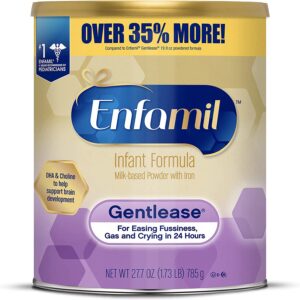What is artificial lactation?
Breastfeeding is the best food for your baby, which is why the WHO recommends exclusive breastfeeding for at least the first 6 months of life, but when this is not possible, formula milk is the appropriate substitute. The artificial feeding is an alternative to ensure the nutrition of the baby as part of a diversified diet, under the supervision of the pediatrician.
Next, we will explain in detail what formula breastfeeding consists of and the types of formula milk that we can find.
Artificial breastfeeding: what is it?
Artificial lactation, also called breastfeeding with formula milk , consists of nourishing the little one with a food product used as a partial or total substitute for breast milk . This type of milk provides an adequate supply of nutrients for the baby’s needs.
The formulas are obtained from cow’s milk, but it is modified to try to get as close as possible to breast milk in terms of its content of proteins, fats, carbohydrates, vitamins and mineral salts, as well as other micronutrients. It is used on occasions when breastfeeding, for one reason or another, is not possible or is insufficient. In the latter case, mixed breastfeeding is usually used so that the baby obtains the necessary nutrients for its correct development.
How will formula affect the development of the baby?
Artificial milk or formula milk contains all the necessary nutrients for the normal development of our baby, both cognitively and motor. If the quantities are respected, always according to the pediatrician’s instructions, the artificial milk will allow the normal development of our baby. Similarly, there are no studies showing that bottle feeding of formula has any influence on bonding with the mother.
What if my baby has an allergy to artificial milk?
In cases where we detect that our baby suffers an allergic reaction to the formula milk that we are giving him, we must go to the pediatrician. If we detect that our baby has an allergy ( how to know that the baby has an allergy to milk ) our pediatrician will help us find an alternative. There are milk adapted for this type of situation and that will allow us to continue feeding our little one without problems.
How do I choose formula for my baby?
In this article on how to choose formula milk for the baby we give you all the details, but you should know that it is recommended that you consider both the proteins that have been used and all the ingredients and nutrients that the formula provides (calcium, iron, DHA , etc). In any case, if you have any questions, you can always consult your pediatrician.
Types of formula milk
There are several types of formula milk that are adapted to the needs of the baby based on his age.
- Stage 1 Milk: This is a starter formula that is used from birth to six months of age.
- Stage 2 milk: also called follow-on milk, it covers the nutritional needs of your baby from 6 months as part of a diversified diet. Enfamil Premium COMPLETE 2 contains a special blend of DHA, iron, calcium, zinc and vitamins that supports the growth and development of the baby. It also contains dietary fiber that helps less hard stools. Its use is recommended until 12 months of age.
- Stage 3 milk: also known as growth milk or infant formula, it is used from 12 months of age. Enfamil Premium COMPLETE 3 meets nutritional needs as part of a diversified diet for children 1 to 3 years of age. It is used as part of a balanced diet to provide adequate nutrition for the little one.
If you are thinking of switching from breastfeeding to a bottle with formula milk, it is essential that you consult your pediatrician for advice on the process. At first it may be complicated, since the baby is used to the breast but, little by little, with patience and with the advice and instructions of the pediatrician, it is achieved.
What infant milk to choose
From 6 months, formula milk should be the basis of the diversified diet of the baby . That is why it is very important to choose the ideal formula milk that has the nutritional contributions that the little one needs at this stage of his life. For example, Enfamil Premium COMPLETE 2 Stage 2 formula contains:
- The level recommended by many experts of DHA, which is a specific type of Omega 3. DHA contributes to the normal visual development of children up to 12 months of age, with a daily intake of 100 mg of DHA. DHA is also present in breast milk, so it is already a natural part of the baby’s diet.
- Iron, which promotes normal cognitive development and helps the immune system.
- Calcium for the proper development of bones and teeth, and zinc, which is vital for good growth.
- Vitamin C, for the immune system, and vitamin D, which is good for strengthening and helping bone growth.

After stage 2 follow-on milk, you can continue with stage 3 growth formula or infant formula , such as Enfamil Premium COMPLETE 3 , for children from 1 year to 3 years. Specifically, this infant milk preparation provides:
- ALA, which promotes growth development, with a daily intake of 2 g of alpha linolenic acid.
- Contains 25 times more iron than cow’s milk. This is very important because this nutrient helps normal cognitive development and the immune system.
- It includes up to 9 times more vitamin C than cow’s milk, which supports the immune system, and also vitamin D, which contributes to the development of bones.
- You cannot miss the great contribution of calcium for the bones and zinc, an essential mineral for the growth of the little one.

Now that you know what artificial breastfeeding is and what are some of the appropriate formulas for each stage, you can make, together with your healthcare professional, the most appropriate decision to guarantee the correct nutrition of your little one.


